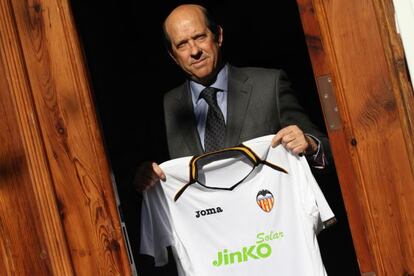"The hardest to sell was Mata"
Manuel Llorente has steadied Valencia's finances in two-and-a-half years in charge

The man who has dragged Valencia out of its financial black hole does not want to say how old he is. In two-and-a-half years as president, Manuel Llorente has reduced the club's debt by 200 million euros, to 360 million. A member of the Valencia board in various capacities since 1995, Benetússer, Valencia-born Llorente took control of the club after Juan Soler stood down. According to reports in the Spanish media, the former president had left a paltry 11,000 euros in the club coffers. Always alert to the team's needs, Llorente eats with the players on away trips to make sure no detail escapes him.
Question. Where does your hard-working spirit come from?
Answer. I was educated at the Civil Guard orphanage in Madrid where there was fierce competition to get good grades so you could go on studying. And of the businessmen I have worked with, [Mercadona owner] Juan Roig stamped a great capacity for work on me.
Q. Is it true you go around turning the office lights off?
A. I do what I would do at home. If I leave a room, I turn off the light. If I go out to eat, I don't have a coffee, a liqueur and a cigar because at home I don't either.
Q. Which team did you support when you were young?
A. Valencia. My school was close to the Bernabéu and I'd go whenever Valencia played. I remember Guillot, a winger, and Di Stéfano.
Q. Do you admire the players?
A. Yes, because they have to make a lot of sacrifices to be in the élite. I got on very well with Cañizares, Ayala, Pellegrino, Mendieta... Now, Piojo López phones me every now and again and says: "Sign me." I also learned a lot from talks with Zubizarreta.
Q. Have you had problems with any coaches? They say you didn't get on with [Rafa] Benítez...
A. I never had a problem with Benítez, it was him who ended his contract a year early.
Q. Of your 110 million-euro budget, how much goes toward the team?
A. It used to be 110 percent, now it is 78 percent and it should be 70 percent. But there is no wage cap. The one who earns most has to be the most valuable, and recognized as such by his teammates. And the coach isn't the one who earns the most.
Q. But he has the most responsibility...
A. I have more.
Q. Are you the only professional club president?
A. No, almost all of us get paid. Here we roll director general and chief executive into the presidency.
Q. How much annual interest does the club pay?
A. Fourteen million euros. We've balanced the accounts since we arrived in 2009. Now we don't have to ask for credit to cover our losses.
Q. Is it easy to reduce debt by selling the best players?
A. No. Valencia has had the luck of having good players but that makes other clubs want them. We have been able to take advantage of the market. The hardest to sell was [Juan] Mata, because he was identified with the club and we loved him a lot. Selling Villa was also a necessity.
Q. Do you suffer watching the team?
A. Yes. The other day in the Calderón I knew it was a game that would set out a marker, like the Battle of Las Navas de Tolosa during the Reconquest, because Atlético is very similar to us.
Q. Have you contributed to the status quo by siding with Real and Barcelona in the sharing of television revenue?
A. I'd like it to be made public how much they make from their shirts. Why? Because they are always in the media.
Q. Will Valencia compete with them again?
A. I think so. Right now both Real and Barça have very strong coaches who compete among themselves and forget about the rest of us.
Q. Your complaints about the referee last week in the King's Cup match against Barcelona sounded like victimism.
A. We are not victims. It is forbidden at the club to talk about referees, only about what we can improve. But when [José Manuel Pinto's handball] was so obvious...
Tu suscripción se está usando en otro dispositivo
¿Quieres añadir otro usuario a tu suscripción?
Si continúas leyendo en este dispositivo, no se podrá leer en el otro.
FlechaTu suscripción se está usando en otro dispositivo y solo puedes acceder a EL PAÍS desde un dispositivo a la vez.
Si quieres compartir tu cuenta, cambia tu suscripción a la modalidad Premium, así podrás añadir otro usuario. Cada uno accederá con su propia cuenta de email, lo que os permitirá personalizar vuestra experiencia en EL PAÍS.
¿Tienes una suscripción de empresa? Accede aquí para contratar más cuentas.
En el caso de no saber quién está usando tu cuenta, te recomendamos cambiar tu contraseña aquí.
Si decides continuar compartiendo tu cuenta, este mensaje se mostrará en tu dispositivo y en el de la otra persona que está usando tu cuenta de forma indefinida, afectando a tu experiencia de lectura. Puedes consultar aquí los términos y condiciones de la suscripción digital.








































